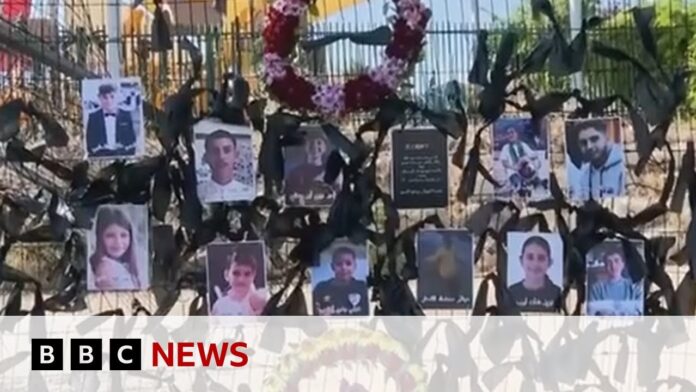Ibrahim Ibrahim’s desperate 27-hour search for his son Guevara after a rocket attack on Majdal Shams ends in sorrow, as DNA confirms the boy was one of the 12 children killed
On a fateful Saturday, a rocket attack on Majdal Shams, a Druze town in the Israeli-annexed Golan Heights, shattered lives and left the community in mourning. The rocket, fired from Lebanon, struck a local playing field where 11-year-old Guevara Ibrahim was enjoying a football game with friends. The attack, which occurred just seven kilometers from the Lebanese border, sent Ibrahim Ibrahim into a frantic search for his son.
When the sirens blared, signaling incoming rocket fire, Ibrahim’s thoughts immediately turned to Guevara, who had been at the playing field. Rushing to the scene, he found the area devastated—children wounded and blood staining the ground. Despite the chaos, there was no sign of Guevara. Ibrahim and his wife, Dalia, searched local clinics and hospitals, hoping for news of their son. They were guided from a clinic to Safed hospital, and then to Haifa, where they were misled to believe Guevara was undergoing surgery.
As hours turned into a full day, the couple remained hopeful despite growing despair. Ibrahim’s brother-in-law, who reviewed security footage, saw Guevara in the last moments before the attack—playing football and moving towards the bomb shelter when the rocket struck. This realization suggested that Guevara might have been too close to the blast for any remains to be found.
After 27 agonizing hours, Ibrahim and Dalia received the heartbreaking confirmation that Guevara was among the 12 children killed. DNA results from the scene matched samples from Dalia. The news marked the end of their search but only deepened their grief.
Majdal Shams, with its 11,000 residents, was plunged into mourning. Black flags and memorials adorned the town as the community came together to grieve. The local authorities and the Israeli Prime Minister vowed a severe response to the attack, which Israel attributed to Hezbollah. However, Hezbollah denied involvement.
Ibrahim, a fruit packing factory worker, expressed a desire for peace rather than revenge. Despite the tragedy, he maintained his belief in non-violence, emphasizing that war only brings suffering to children and families.
Analysis:
Political:
The rocket attack on Majdal Shams has intensified the already fragile political relations between Israel and Lebanon. With Israel holding Hezbollah responsible, the attack underscores the broader regional conflict involving Hezbollah and its support for Hamas. Netanyahu’s commitment to a severe response reflects Israel’s broader strategy of maintaining security while navigating complex international relations. This incident highlights the direct impact of regional conflicts on civilian areas far from the front lines, influencing both domestic policies and international diplomatic efforts.
Social:
The tragedy in Majdal Shams serves as a stark reminder of the human cost of ongoing conflicts. The loss of 12 children in a single attack has a profound effect on the community, reflecting the broader societal impact of violence. The collective mourning and memorials, including black flags and commemorative setups, demonstrate the community’s grief and its resilience. This event mirrors the broader societal debates on the effects of conflict on innocent lives and highlights the need for increased humanitarian considerations in wartime policies.
Racial:
The Druze community’s experience in Majdal Shams reveals the complexities of identity and security in conflict zones. The Druze, an Arabic-speaking minority with a unique cultural and religious identity, have historically navigated their position between Israeli and Syrian influences. The attack challenges their perceived safety and brings racial and cultural tensions to the forefront. The community’s reaction, marked by mourning and calls for peace, reflects the broader struggles of minority groups in conflict-affected regions, highlighting their vulnerability and the need for nuanced understanding of their plight.
Gender:
The impact of the rocket attack on families, particularly the roles of fathers and mothers in the aftermath, underscores the gendered dimensions of grief and resilience. Ibrahim’s search for Guevara and Dalia’s emotional journey reflect different aspects of coping with loss. Fathers often take on roles of searching and dealing with practical aspects, while mothers typically handle the emotional burden. The narrative of their struggle highlights how gender influences experiences of grief and the ways in which families navigate tragedy.
Economic:
The economic consequences of the rocket attack extend beyond the immediate damage to infrastructure. Majdal Shams, a close-knit community, faces economic strain from both the physical destruction and the psychological impact on its residents. The disruption of daily life and potential impacts on local businesses and services illustrate the broader economic ramifications of violence. The community’s recovery will involve not only addressing physical damage but also supporting the economic stability and mental health of its members in the aftermath of such a devastating event.
